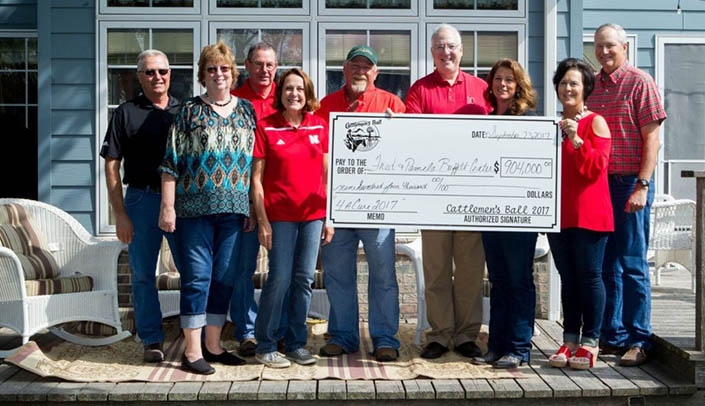The Fred & Pamela Buffett Cancer Center recently funded 17 cancer research pilot projects totaling nearly $1 million.
The Cattlemen’s Ball
Because of the generosity of the Cattlemen’s Ball of Nebraska, Inc., the Fred & Pamela Buffett Cancer Center is able to fund multiple research pilot projects annually.
“The Cattlemen’s Ball is a unique fund raiser where 90 percent of the proceeds goes to the Buffett Cancer Center to support cancer research,” Dr. Cowan said. “Without the generosity of the Cattlemen’s Ball and all of the cancer center’s donors, this pilot grant program would not be possible and many novel exciting research projects would not be initiated.”
Since its beginning in 1998, the Cattlemen’s Ball of Nebraska has raised more than $13 million for cancer research at the Fred & Pamela Buffett Cancer Center. This year’s ball is taking place at Hergott Farm in Hebron, Neb., on June 1 and 2. For tickets and more event information, click here.
The grants were funded by the Cattlemen’s Ball of Nebraska and included six pilot projects in pediatric cancer through a partnership with the UNMC Pediatric Cancer Research Center.
“The overall goal of the program is to initiate pilot research projects that have the potential to develop into nationally funded high-impact translational cancer research projects in the cancer center,” said Ken Cowan, M.D., Ph.D., director of the Fred & Pamela Buffett Cancer Center.
Forty-five applications were received for six target areas that were identified by the cancer center’s senior leadership team and its external advisory board:
- molecular and biochemical etiology;
- cancer genes and molecular regulation;
- gastrointestinal cancer;
- cancer prevention and control;
- investigator-initiated cancer concepts; and
- American Cancer Society Institutional Research Grant pilot projects (i.e. junior investigator awards).
“The opportunity to partner with the Fred & Pamela Buffett Cancer Center to fund six additional pilot grants totaling $325,000 was an excellent opportunity for what will hopefully lead to future funding from national agencies for these investigators,” said Don Coulter, M.D., associate professor of pediatric hematology and oncology and director of the UNMC Pediatric Cancer Research Center.
All applicants were invited to participate in the review session, which was a single study section wherein all of the submitted proposals were reviewed.
“This unique format was employed in order to gather appropriate expertise, and expedite and ensure the transparency and integrity of the review process,” said Tony Hollingsworth, Ph.D., associate director for basic research at the Fred & Pamela Buffett Cancer Center. “Study section participants were required to excuse themselves from the review of their applications and those for which they had any identified conflict of interest, but they were encouraged to take part in the discussion, evaluation, and voting process for all other applications.
“In effect, the applicants established the priority scores that resulted in the selection of awarded grants,” he said.
The study section required a full day of commitment from participants, which included applicants from UNMC, the University of Nebraska at Kearney and the University of Nebraska at Omaha.
